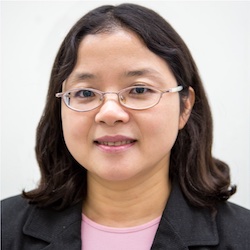
The Department of Biochemistry and Molecular Genetics presents:
Wei Xu, PhD
Marian A. Messerschmidt Professor of Oncology
Associate Director, McArdle Laboratory for Cancer Research
Co-Director, Genetic and Epigenetic Mechanism Program, Carbone Cancer Center
University of Wisconsin-Madison
Presentation: "Protein Arginine Methylation: Mechanisms and Therapeutic Vulnerabilities in Human Breast Cancer"
Abstract:
Numerous essential biological processes are controlled epigenetically by methylating proteins on arginine and lysine residues. However, studies on ‘writers’, ‘readers’, and ‘erasers’ of methyl-arginine marks and chemical/pharmacological modulation of PRMTs lag far behind those of lysine methylation. The Xu laboratory addresses this critical gap by systematic studies of CARM1, revealing high-impact insights into the mechanisms through which CARM1 exerts its epigenetic actions. To unbiasedly dissect the mechanism of this epigenetic enzyme in breast cancer progression and metastasis, the Xu lab performed global screening that identified numerous CARM1 substrates (Shishkova E., Nature Comm. 2017) and demonstrated that methylation of specific substrates regulates well defined hallmarks of cancer (Wang, L. Cancer Cell, 2014; Wang, L. Science Adv., 2015; Liu F., Nature Cell Biol, 2017, Liu F., EMBO J, 2021). The recent discovery that BAF155, a component of chromatin remodeling complex SWI/SNF and RNA processing proteins are CARM1 substrates revealed insights into oncogenesis and potential therapeutic vulnerabilities to CARM1 inhibition (Kim E., Nucleic Acid Res., 2021). Pharmacological inhibition of CARM1 boosts host immune responses by enhancing cytotoxic T-cell activity and tumor infiltration of CD8+ T cells. The studies demonstrate that epigenetic modulation by CARM1 inhibition is a novel means to sensitize immunologically ‘cold’ triple-negative breast cancer to immune check point inhibitors.
The Xu laboratory also identified transcription elongation factor PAF1 as a ‘reader’ of CARM1-mediated histone H3 methylation (H3R17me2), thereby revealing the mechanism through which CARM1 activates transcription (Wu, J., PNAS, 2011; Zeng, H. Genes & Development, 2015, Zeng, H. BMC Genomics, 2016). CTR9 controls the levels and genomic distribution of H3K27me3 in breast cancer cells (Chan N. NAR, 2022). Moreover, CTR9 depletion profoundly affects PRC2 subtype switch and generates vulnerability that renders breast cancer cells hypersensitive to PRC2 inhibitors. These findings uncover that CTR9 acquires novel chromatin regulatory functions by demarcating the PRC2-mediated H3K27me3 domains and provide the basis for therapeutically targeting CTR9-low breast tumors with PRC2 inhibitors.
Host: Dr. Lu Wang, Assistant Professor, Biochemistry and Molecular Genetics
Audience
- Faculty/Staff
- Student
- Post Docs/Docs
- Graduate Students